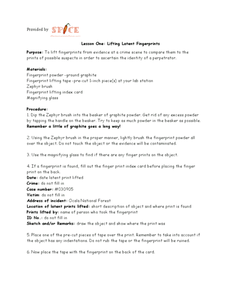Curated OER
Science: Entomology in Action
Learners discover how coroners use insect life cycles to estimate the time of death in cases. they describe how forensic entomologists combine environmental factors with insect life cycles to note the changes. Students examine an...
Curated OER
Wanted - Butch and Sundance
Students explore forensic anthropology. Given data, students determine which bones might have been the remains of which individual. They discuss how scientists work with inconclusive data.
Curated OER
Blood Analysis
Pupils reconstruct a crime scene to produce the blood spatter pattern. For this forensic science lesson, students describe the events that lead to produce such patterns. They explain the importance of blood analysis in solving crimes.
Curated OER
Name That Tune: Matching Musical Tones Through Waveform Analysis
Pupils detect the waveform of musical notes to determine the code for the "safe" in this forensics simulation lesson. They use a microphone and tuning forks along with Vernier EasyData on their graphing calculator to analyze five musical...
Curated OER
Forensic Examination of Artifacts: The Mystery of Meriwether Lewis' Death
Students role play the position of a scientist to gather information on Meriwether Lewis' death. They discover what he did after the famous expedition and how centuries affect the study of a body. They share their information with the...
Curated OER
Crime Scene Documentation
Students become forensic investigators. In this crime scene instructional activity, students go to the science lab which is the "scene of the crime." They collect evidence such as fingerprints, "blood" evidence, chromatography,...
Curated OER
Applied Science - Science and Math Lab
Students examine fabric. In this Applied Science lesson plan, students look at the fibers of fabric through a microscope. Students compare and contrast a variety of fibers.
University of Colorado
Patterns and Fingerprints
Human fingerprint patterns are the result of layers of skin growing at different paces, thus causing the layers to pull on each other forming ridges. Here, groups of learners see how patterns and fingerprints assist scientists in a...
Curated OER
Fiber Identification
Lab sheets for three different crime scene investigation activities are tucked into this resource. In the first activity, inquisitors examine a variety of fibers, including the fiber found at "the crime scene," under ultraviolet light....
Curated OER
Recovering the Romanovs
Students use DNA to solve an identity mystery. In this biology lesson, students use the Internet to gather information about sex-linked disorders and complete a Punnett square for hemophilia, then examine a handwriting analysis, ear...
Curated OER
The Case of Similar Substances
Middle schoolers solve a crime mystery using chemical tests. They review the crime scenario and then become familiar with the procedure and results for two tests used to identify unknown powders. They perform the tests on the crime...
Curated OER
DNA Fingerprinting
Students discuss methods used by forensic scientists and the basics of DNA and how it can be used to identify an individual after reading an article from The New York Times.
Curated OER
Forensic Files
Students create a model of DNA and relate it to the differences between individual people in their nitrogen base sequences. They analyze a crime scenario in which they perform several different types of tests.
Curated OER
Science: Handwritten Personality
Students watch an episode of "Frontiers" and discover the scientific basis for handwriting analysis. In the video, they discover how size, shape, and slant of handwriting suggest personality traits. After a discussion, students offer...
Curated OER
Hunt for the Serial Arsonist
Students prepare study, and graph fingerprint patterns. They create latent fingerprints and look for common features in their prints for classification.In addition, they create a graph showing the distribution of different patterns...
Curated OER
Solving Mysteries Using Paper Chromotagraphy
Students solve the mystery of the kidnapped teacher by analyzing a ransom note using paper chromatography. They carefully prepare ink samples from the note to known ink samples to determine the kidnapper.
EngageNY
Newton’s Law of Cooling, Revisited
Does Newton's Law of Cooling have anything to do with apples? Scholars apply Newton's Law of Cooling to solve problems in the 29th installment of a 35-part module. Now that they have knowledge of logarithms, they can determine the decay...
Curated OER
Audio Engineers: Sound Weavers
Learners explore audio engineering. In this career education and "sound" science lesson, students define related vocabulary and make connections between the music they listen to and the job an audio engineer does after listening to...
Curated OER
Forensics: Who Killed the Iceman?
Students explore how archaeologist examine mummies. In this research based lesson, students work in groups to research two mummies and report their findings to the class through role-playing and using a model of the mummy.
Curated OER
Forensic Science - A Paternal Case
Ninth graders identify and relate terms in biotechnology. They discuss genetic engineering in the world today. Students are given a worksheet to determine the father in the paternal case. They complete answers on the worksheet.
Curated OER
Fabulous Forensic Fingerprints
Learners explore the uniqueness of each person's individual body. They identify traits and characteristics of the human body, with a main focus on the uniqueness of fingerprints and footprints. Students examine and compare fingerprints....
Curated OER
Forensics Crime Lab
Students brainstorm ways to look for evidence and investigate suspects. In this investigative lesson students pretend to be investigators and analyze a crime scene.
Curated OER
Writing As Criminal Evidence
Young scholars research 2 famous forgery cases. In this forensics lesson, students are introduced to the methods of handwriting and paper analysis. They then use the Internet to study the cases of the Lindbergh baby and Howard Hughes'...
Curated OER
Lesson One: Lifting Latent Fingerprints
Crime scene investigators practice collecting fingerprints off of surfaces in order to compare them to an imaginary crime suspect's prints. Instructions for using graphite powder and a Zephyr brush to collect the evidence are outlined....
Other popular searches
- Forensic Science Powerpoint
- Forensic Science Project
- Forensic Science Blood Type
- Vocabulary Forensic Science
- Forensic Science Lab
- Forensic Science Power Point
- Forensic Science Activities
- Forensic Science Fingerprint
- History of Forensic Science
- Forensic Science Entomology
- Forensic Science Archaeology
- Forensic Science Archeology

























